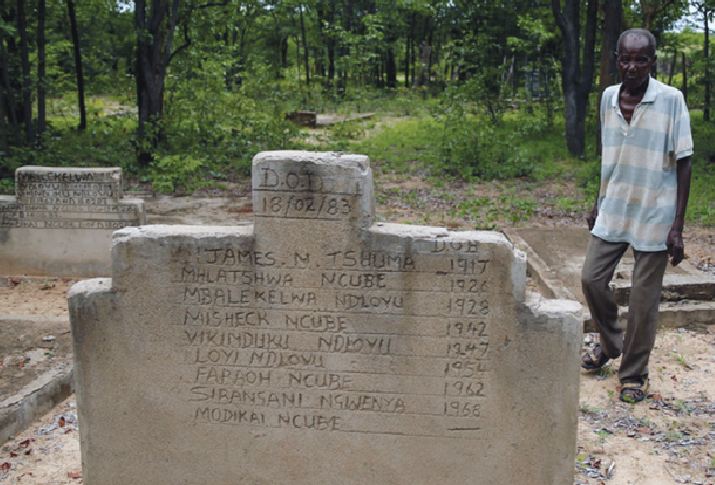Source: Gukurahundi: Pressure groups demand truth from Mnangagwa – The Zimbabwe Independent April 26, 2019
Melwa Ngwenya walks around mass graves of people killed during Gukurahundi massacres in the mid-1980s near Tsholotsho. Pic: Reuters.
PRESSURE groups coalescing under the banner of the Matabeleland Collective are ratcheting up pressure on President Emmerson Mnangagwa to ensure that a truth-telling and associated prissuesprocess precludes any government intervention on the Gukurahundi genocide.
By Nyasha Chingono
This comes as government two weeks ago announced plans — without broad-based consultations — to address concerns surrounding the killing of 20 000 civilians in Matabeleland and Midlands by the North Korean-trained Fifth Brigade in the 1980s.
The Matabeleland Collective compendium seen by the Zimbabwe Independent details demands by Bulawayo-based civil society organisations on behalf of families who lost their loved ones between 1983 and 1987 when the atrocities were committed.
The pressure groups want government to immediately release the Chihambakwe and Dumbuchena commissions of inquiry reports detailing the extent of the atrocities as part of truth-telling before justice and compensations issues can be addressed.
National Peace and Reconciliation Commission (NPRC) chairperson Justice Sello Nare last week said they were still looking for the reports which are said to be missing.
The Dumbutshena commission of inquiry, which investigated the events surrounding the Entumbane clashes between Zipra and Zanla forces between November 1980 and March 1981 and the commission of inquiry into the Matabeleland massacres, also known as the Chihambakwe commission of inquiry, which probed the Fifth Brigade’s mass killings between 1983 and 1987, were ignored by former president Robert Mugabe’s successive governments.
In 2000, two human rights groups, the Legal Resources Foundation (LRF) and the Zimbabwe Lawyers for Human Rights (ZLHR), filed an application at the Supreme Court compelling Mugabe to release the two reports, but the deposed strongman would not oblige.
In its document, the Matabeleland Collective said it would engage the NPRC in order to facilitate the truth-telling process, justice and compensation, among other things.
“Due to the lack of acknowledgement of the Gukurahundi massacres, there has been a withholding of the truth and also the withholding of commission’s reports on the events leading to and during gukurahundi. The Dumbutshena and Chihambakwe Commissions reports have never been released; the British Government also has reports not made available. The Collective needs to engage the NPRC to facilitate truth telling on the Gukurahundi massacres,” the petition reads.
The Matabeleland Collective also questioned the sincerity of the 1987 Unity Accord between Mugabe and former Zapu President Joshua Nkomo, stating that the political settlement had failed to bring closure to Gukurahundi.
“Who can forget the never published results of the Chihambakwe and Dumbutshena Commissions? The Unity Accord only proffered a political solution and a blanket amnesty to perpetrators on both sides of the political divide but the victims and survivors didn’t reap any peace dividend apart from the cessation of physical violence.”
The pressure groups also demanded investigations on reports of rampant rape cases during the atrocities, which in essence would amount to war crimes.
Government’s last attempt to ensure national healing during the Government of National Unity (GNU) failed to bring closure to the Gukurahundi issue.
To bring closure to most families who lost their loved ones, the Matabeleland Collective wants remains of thousands buried in shallow and mass graves to be exhumed and properly reburied.
“Thirty-five years has gone by and there has been no official process to conduct an exercise to identify burial sites and heal the living as they bury their dead with dignity. The spirits of these people need to be brought to rest and families need to be accorded an opportunity to exhume and rebury their loved ones according to their traditions, so they can at least complete the mourning process and bring some closure.
“Extensive work must be done to locate graves, both the mass and shallow graves and those where victims were thrown down mine shafts at several sites, including Bhalagwe in Matobo district,” the Matabeleland Collective compendium reads.
Last week, Nare said the NPRC would open public hearings during the first week of May in Kezi before moving to Gwanda, Tsholotsho, Lupane and Nkayi. In order to cover ground, the commission will be split into two groups, one responsible for Matabeleland region, while the other will focus on the Midlands province.
Nare said his commission will be supporting exhumations and reburial of victims. The first exhumation is scheduled to be conducted on May 27 in Sipepa, Tsholotsho.
Nare added that the commission would facilitate the issuance of identity documents like birth and death certificates, one of the key issues that haunted communities in the affected regions.
“Additionally, due to the centralisation of obtaining birth records requiring travel to the capital city, very few can or bother to get these records. GoZ (government of Zimbabwe) in making amends could provide a 10-year moratorium to the regions and allow decentralisation and ease of access so that the region equalises access,” he said.
Older Post
Mystery shrouds CIO boss’ death 
COMMENTS